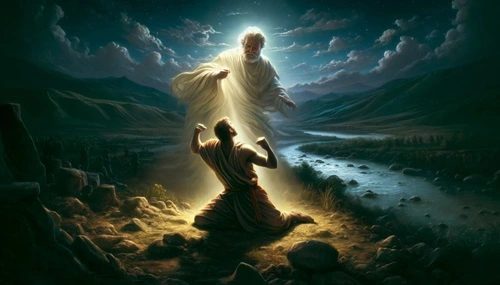The biblical account of Jacob wrestling with God, as detailed in Genesis 32:22-32, stands as one of the most enigmatic and profound narratives in the Scriptures. This event, occurring during a pivotal moment in Jacob’s life, offers rich insights into themes of struggle, transformation, and divine encounter.

Jacob’s Return and Anticipation
After two decades of service under his uncle Laban, Jacob embarks on a journey back to his homeland. This return is fraught with tension, as Jacob anticipates a reunion with his estranged brother, Esau, whom he had previously deceived. Fearing Esau’s retribution, Jacob sends ahead gifts and divides his family and possessions, hoping to mitigate potential conflict. Alone and vulnerable, Jacob finds himself at a crossroads, both physically and spiritually.
The Mysterious Encounter: Wrestling with the Divine
In the solitude of the night, Jacob is confronted by an unknown man, leading to an intense wrestling match that endures until daybreak. The identity of this man is a subject of much theological debate. Some interpretations suggest he is an angel, while others posit that Jacob wrestles with a manifestation of God Himself. The latter view is supported by Jacob’s own declaration: “I saw God face to face, and yet my life was spared” (Genesis 32:30).
The Significance of the Struggle
This physical struggle symbolizes Jacob’s lifelong pattern of striving and contention. From his birth, where he grasped Esau’s heel, to his dealings with Laban, Jacob’s life is marked by relentless pursuit and struggle. This nocturnal wrestling can be seen as the culmination of his internal and external conflicts, representing a profound spiritual transformation.
The Transformation: A New Identity
As dawn approaches, the divine being dislocates Jacob’s hip, a move that incapacitates yet does not deter him. Jacob clings on, demanding a blessing. In response, he is granted a new name: Israel, meaning “he struggles with God.” This renaming signifies a transformation from a man defined by deceit and self-reliance to one who has engaged directly with the divine and emerged changed.
The Aftermath: A Marked Man
The encounter leaves Jacob with a limp, a physical manifestation of his divine encounter. This limp serves as a perpetual reminder of his struggle and the transformation it wrought. It also symbolizes the idea that encounters with the divine, while transformative, can leave lasting marks.
Lessons and Reflections
- Perseverance in Faith: Jacob’s refusal to release his grip until he receives a blessing underscores the importance of persistence in one’s spiritual journey. This tenacity is emblematic of a deep desire for divine favor and transformation.
- Embracing Vulnerability: The injury Jacob sustains highlights the necessity of vulnerability in spiritual growth. It is through acknowledging one’s weaknesses that true strength and transformation are found.
- Transformation Through Struggle: Jacob’s encounter illustrates that personal and spiritual growth often emerge from periods of intense struggle and confrontation with one’s own nature and with the divine.
Contemporary Relevance
In modern spiritual discourse, Jacob’s wrestling is often interpreted as a metaphor for the human experience of grappling with faith, doubt, and personal transformation. It serves as a reminder that spiritual growth is not a passive journey but one that may involve intense struggle and perseverance.
Conclusion
Jacob’s wrestling with God is a narrative rich with layers of meaning, offering insights into the nature of human struggle, divine encounter, and transformation. It challenges individuals to reflect on their own spiritual journeys, the struggles they face, and the transformations that arise from engaging deeply with the divine.


